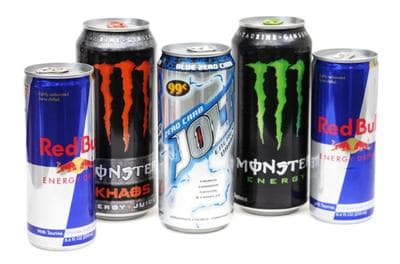Advertisement
Energy Drinks: How Much Caffeine Is Too Much?

The beverage industry is faulting a government study that reports a surge in energy drink-related emergency room visits.
The Drug Abuse Warning Network (DAWN) recently reported that E.R. visits doubled from 2007 to 2001, with teenagers and young adults accounting for most of the 21,000 visits in 2011.
- Read the full DAWN report
Energy drinks contain high levels of caffeine, and patients exhibit symptoms including rapid heart beat, palpitations, nervousness, anxiety, sleep disturbances and high blood pressure.
"I'm sick and tired of the comparison between energy drinks and coffee... Coffee is bitter, it's hot, and it's not a beverage that is served to children."
Dr. Mary Claire O'Brien
Monster Beverage Corporation says the report is flawed because it doesn't take into account other health factors of the patients. Monster also noted that 42 percent of the visits resulted from consuming energy drinks as well as drugs or alcohol.
"I think it's true that it's difficult to prove causality," said Dr. Mary Claire O'Brien, an expert on energy drinks at the Wake Forest School of Medicine in Winston-Salem, N.C.
But she points out that more than half of the visits came from people who only drank energy drinks.
Monster also takes issue with the DAWN report for how it compares caffeine in coffee to energy drinks.
Coffee vs. Energy Drinks
The DAWN report calculates that an energy drink contains anywhere from 80 to 500 milligrams of caffeine compared to about 100 mg in a 5-ounce cup of coffee.
But Monster says most people drink 12- or 16-ounce cups of coffee, which puts its product on par with coffee.
Dr. O'Brien finds that comparison troublesome.
"I'm sick and tired of the comparison between energy drinks and coffee. I think it's ludicrous. Coffee is bitter, it's hot, and it's not a beverage that is served to children," Dr. O'Brien said.
Dr. O'Brien says people tend to drink coffee slowly, compared to the sweet, fruit-flavored energy drinks. And when you buy coffee, you know what you're getting.
“So an energy drink is not a food. An energy drink is not a drink. An energy drink is a dietary supplement according to the federal government."
Dr. Mary Claire O'Brien
"If you walk into a Starbucks for example, and you order a double grande, you know that you're buying a highly-caffeinated beverage, that's why you walked in there to buy it. And presumably you're a grown-up and you're not 12!" O'Brien said.
No Limit On Caffeine In Energy Drinks
Dr. O'Brien is concerned that energy drinks are marketed to children, and sold alongside sodas, which have government-mandated limits on caffeine. Energy drinks don't have those same limitations.
The Food and Drug Administration established a safe limit for caffeine in cola-like beverages in 1959 at 200 parts per million (or 71 milligrams for a 12-ounce can of soda, though an average can of Coke has only 35 mg of caffeine).
However, due to a regulatory fluke, energy drinks were classified as dietary supplements when they came on the market in the 1990s.
"So an energy drink is not a food. An energy drink is not a drink. An energy drink is a dietary supplement according to the federal government," O'Brien said.
And that means there is no limit on the amount of caffeine in energy drinks, nor is there any requirement for them to include information about caffeine content on their labels.
Advertisement
- Should the FDA regulate energy drinks the way they regulate soft drinks? Let us know in the comments section or on our Facebook page.
Call For Regulation
Dr. O'Brien said the federal government should regulate the drinks and force them to disclose caffeine on their labels.
Congress has asked energy drink companies to disclose exactly what's in their products.
Meanwhile, the government is investigating five deaths that may be connected to Monster Beverage and 13 deaths that may be connected to 5-Hour Energy.
The companies dispute that their products were responsible for the deaths.
- Pediatrics (journal): Health Effects of Energy Drinks on Children, Adolescents, and Young Adults
- Journal of the American Medical Association: The “High” Risk of Energy Drinks
Guest:
- Dr. Mary Claire O'Brien, emergency physician at Wake Forest School of Medicine who researches alcohol and energy drinks.
This segment aired on January 28, 2013.